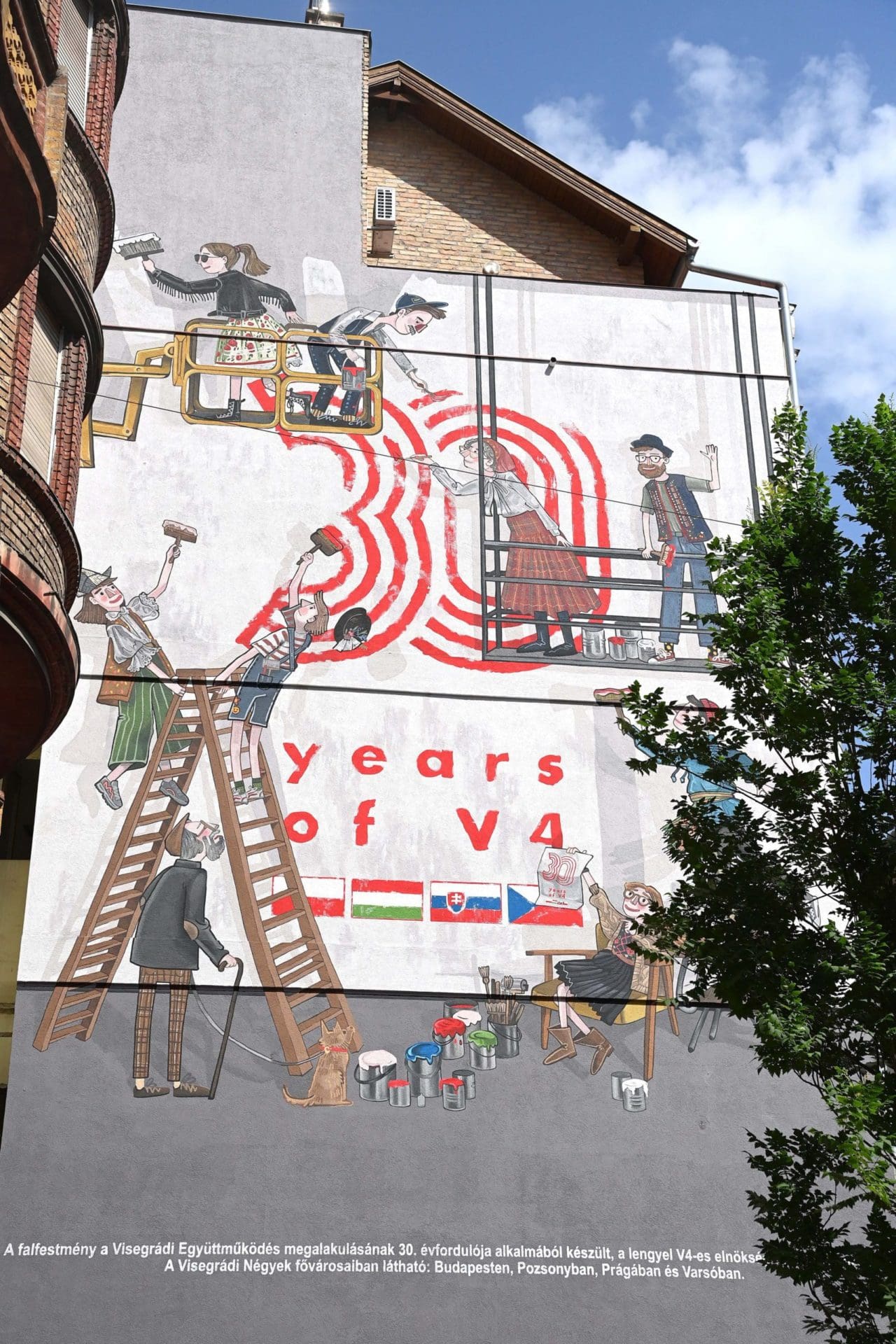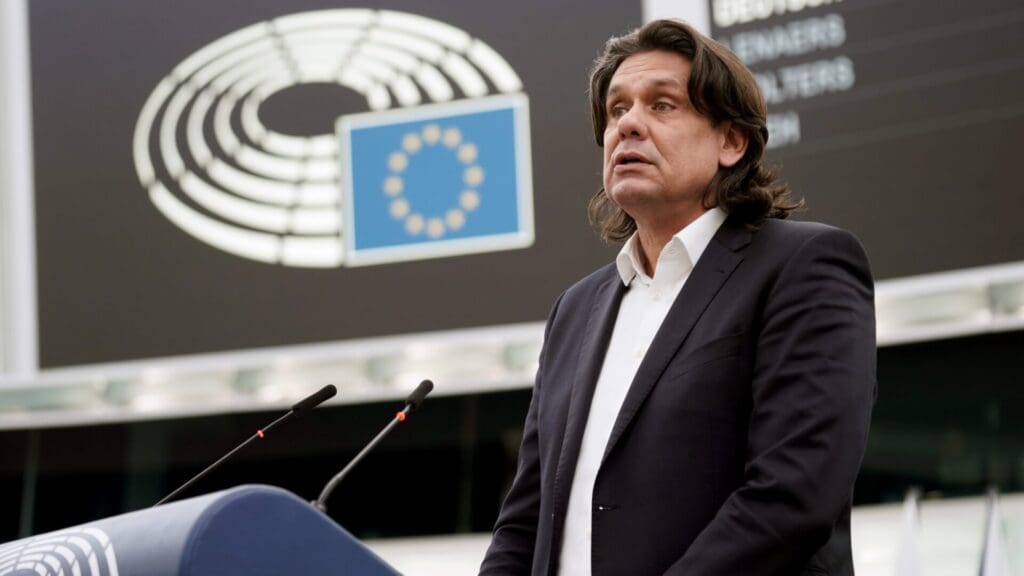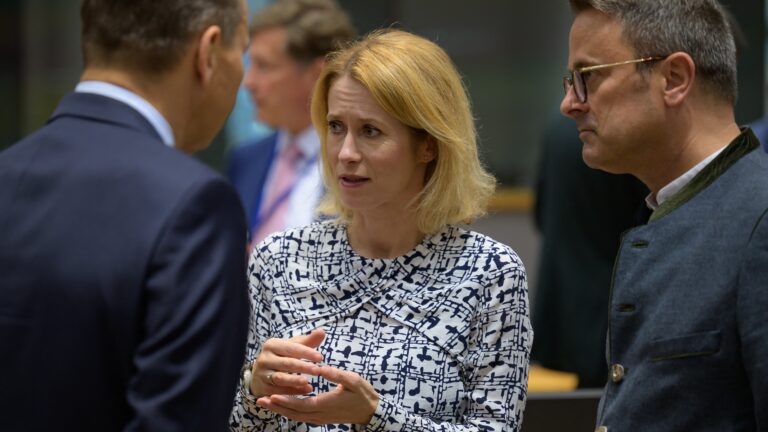Even though the Visegrád Group is primarily an interest-based endeavour, in recent years, in some cases, it has been acting on a value basis. However, the manifestation of this unity is not yet strong enough at the level of the European Union. Hungary and Poland have been aiming to shape the future of this community, but the breakthrough support from their Visegrád partners is lacking. Criticism of their policy can be heard not only from outside the V4, but from inside as well.
The Visegrád Group in the European Parliament
The most visible, directly elected body of the European Union is the European Parliament (EP), which, contrary to its name, is only a co-legislator of this supranational community. In June 2004, one month after the members of the Visegrád Group or V4—the Czech Republic, Hungary, Poland, Slovakia—joined the EU, nationwide elections were held to determine the members of the EP for the next five-year election cycle. At that time, the total number of parliamentary seats was 732, of which the parties of the Visegrád Group possessed 116 (the Czech Republic and Hungary with 24 each, Poland with 54, and Slovakia with 14).1 During that five-year period (2004–2009), after the accession of Bulgaria and Romania in 2007, the number of EP seats rose to 785.2 Due to the adoption of the Treaty of Lisbon in 2009, however, the final count of MEPs declined to 751 (until Brexit),3 of which the Czech Republic and Hungary each delegated 21 members, Poland 51 and Slovakia 13. So, while the Visegrád Group, at the time of accession held 15.85 per cent of the total EP seats, this declined to 14.11 per cent with the ratification of the Treaty of Lisbon. Interestingly, through these changes, the relative weight of Slovakia was minimally increased. Since the United Kingdom left the community after the half- decade-long Brexit procedure, the majority of its 73 seats have remained empty; only 27 have been redistributed among the current member states. In this process, Poland and Slovakia each received an additional seat.4 Today the V4 holds 108 out the 705 mandates, which corresponds to 15.32 per cent of the total. This means that, since the departure of the UK, the V4 has been minimally strengthened, but still does not have the weight it had at the time of the accession
It is not clear today how the UK’s unilateral step will influence the future of this highly symbolic yet increasingly influential body. The Treaty of Lisbon explicitly declares that the members of the EP ‘shall not exceed seven hundred and fifty in number, plus thePresident’.5 It is equally possible that the total number of elected MEPs will not change soon, or it could very well be that the currently empty seats will be divided proportionately among the member countries.
Since in the EP the parties join factions according to their political affiliation, and not according to their national origin, the Visegrád Group’s 108 seats cannot be understood as forming a united faction, especially when it comes to real political advocacy. The majority of Poland’s 52 current MEPs are divided among the three biggest European political groups, the European Conservatives and Reformists Group (ECR: 27 MEPs), the Group of the European People’s Party (EPP: 17 MEPs) and the Group of Progressive Alliance of Socialists and Democrats (S&D: 7 MEPs). There is also one Polish MEP sitting in the Group of the Greens/European Free Alliance.
Hungary’s case is more unique, as the 12 MEPs of the governing party Fidesz have just left the EPP faction and are currently working to establish a new conservative European political group. Five Hungarian seats are held by the S&D, two by the Renew faction, and one MEP has not to date joined any political groupings. Fragmentation can also be observed in the case of Slovakia, since five seats out of the 14 are held by the EPP, three by the S&D, and two each by Renew and the ECR. There are two non-attached members as well. When it comes to the Czech Republic, the left–right ratio is almost completely balanced. Five Czech MEPs are members of Renew Europe, one of the S&D, five of the EPP, four of the ECR, three of the Group of the European Greens/European Free Alliance, two of Identity and Democracy and one of the Confederal Group of the European United Left–Nordic Green Left.6

The reason for the EPP losing its majority within the V4 is due to the departure of the Hungarian ruling party Fidesz
The pie chart above clearly shows that the majority of the MEPs from the Visegrád Group belong to the European Conservatives and Reformists Group. The next largest groups are the EPP, the S&D, and the independents. This line-up, however, is brand new. The reason for the EPP losing its majority (and for the above average representation of the independents) within the V4 is due to the departure of the Hungarian ruling party Fidesz, a step that can be considered the final act of a lingering and wearisome struggle between the former partners. Since the split, the remaining members of the EPP have been talking about a victory of the rule of law. At the same time, Viktor Orbán has already been engaged in negotiations with the former Italian deputy prime minister, Matteo Salvini, and the Polish prime minister, Mateusz Morawiecki, about the possibility of establishing a brand new European political entity for those members of the EP who have grown disillusioned with the formerly conservative elite, which has been steadily shifting from the political right to the left. At their press conference in Budapest, this conservative trio declared the international need for a new European political renaissance.7
The European Commission and the V4
The European Commission (EC) is the politically independent executive body of the EU, whose pan-European weight has been constantly increasing. Its main roles are to protect the interests of the Union and to table laws for adoption.8 According to the principle of one commissioner per member state, there are currently 27 commissioners, led by the president, a post currently held by Ursula von der Leyen. It is important to note that commissioners, in the course of their work, are not allowed to consider the interests of their country of origin. They must work solely for the Union, and no one else.

The current EC cycle is the fifth since the EU accession of the V4 countries in 2004. For the new members, the first period lasted only a few months since it only ran from May 2004 until the end of November of the same year. This stretch corresponded to the last months of the prestigious era associated with the name of Romano Prodi. His successor, José Manuel Barroso had the privilege of leading the EC through two five-year cycles. After him, Jean-Claude Juncker stepped into the European limelight, but only for one term. Since we are in the first half of the von der Leyen Commission, it is hard to tell whether she will be able to win the next cycle in office. Thanks to Brexit, the chances of retaining German leadership have significantly increased. In the Prodi Commission, the commissioners of the V4 countries served only for a few months. Even though the short term in office did not provide a real opportunity to achieve meaningful results, within the paradigm of the V4, only the representatives of Poland and Slovakia received domestic support to continue the work they had begun in Brussels. The first full-length term of the newcomers was completed under the presidency of José Manuel Barroso.
From Chart 2 below, it can be seen that the Central European countries were entrusted with responsible and demanding positions among which both hard and soft issues were present. Personnel changes, however, also took place during this cycle, and, interestingly, in both cases those commissioners who took office under the Prodi Commission immediately after accession left office before the end of their mandate. None of them, however, stepped down as a result of failure, since their careers continued to rise after leaving the position of commissioner.

In the case of Danuta Hübner, the reason for leaving was to become a member of the EP for Poland in the 2009 elections. Ján Figeľ, however, triumphed in the presidential election of his domestic party, the Christian Democratic Movement, and returned to his homeland, Slovakia.
In the next cycle (2009–2014) the Slovakian Maroš Šefčovič became one of the vice-presidents of the EC. From the perspective of both the Slovak Republic and the Visegrád Group, this was a historic moment since no one from the group had been appointed to this high office before him. The only personnel change during this cycle within the studied countries happened in Poland, where Janusz Lewandowski was elected to the EP and was replaced by Dominik Jacek in the EC.

In 2014, Jean-Claude Juncker was elected president of the Commission, and the College of Commissioners was composed of 28 members. During this period, history repeated itself, since the only representative delegated from a V4 country who managed to keep his mandate in the EC was Maroš Šefčovič. He also remained a vice president (VP). From the perspective of Hungary, the year 2014 was also symbolic, since it was the first time in history that the political right proposed the country’s next commissioner.
Also, 2014 was the year when the Czech Věra Jourová entered the EC. Since 2019, she has been serving as one of its vice presidents. From the Visegrád perspective, the latter fact is highly important but controversial, since, on the one hand, this nomination was a clear sign of the continuous upscaling of the Central and Eastern European region, which now has two EC VPs. On the other hand, however, Jourová has been the most determined opponent of the Hungarian and Polish governments on a European level, and she constantly interferes in their domestic political agendas. In an interview, the Czech politician even called Viktor Orbán’s state ‘a sick democracy’, in response to which the Hungarian prime minister publicly called upon her to resign.13 Jourová did not comply with this call.
Orbán’s strained relationship with Jourová, however, does not appear to affect either Czech–Hungarian bilateral relations or intra-Visegrád relations. This is true even though the commissioner is a member of the Czech governing party ANO, which was led by a former prime minister of the Czech Republic and one of Orbán’s most important allies, Andrej Babiš. He, in the manner of a good diplomat, wishes to be agreeable to both sides. So not only does he praise Jourová’s European performance, he also strives to maintain good relations with his Visegrád partners. In an interview with the German periodical Die Welt, Babiš stated that ‘Poland and Hungary are sovereign countries with democratic elections. The internet is not censored, and people are not stupid. If they are not happy with their government, they will replace it.’15
The European Council
Tusk’s example clearly reveals that national and European matters and interests are separated, and on the European level, political affiliation usually surpasses the national one
The European Council (EUC) is the body that defines the EU’s priorities and political directions. During its meetings, it adopts conclusions or agendas but does not pass laws. The members of the EUC are the president of the European Council, the president of the European Commission, and the heads of states or governments of the member countries. When security issues are discussed, the high representative of the Union for Foreign Affairs and Security Policy is also present. Decisions are mostly made by consensus; however, in some cases unanimity or a qualified majority are required.16 Since the adoption of the Treaty of Lisbon in 2009, the current president, Charles Michel is the third to fill the position. His predecessor was the Polish politician Donald Tusk, who served in office between 2014 and 2019. (Before him the position was held by Herman Van Rompuy, from 2009 to 2014.) Giving a president to the EUC was a privilege both to Poland and the Visegrád Group. However, Tusk’s example clearly reveals that national and European matters and interests are separated, and on the European level, political affiliation usually surpasses the national one.
From the Visegrád perspective, the EUC is the main field of advocacy. Since most of the arrangements are made by consensus, practically every country has the chance to block the decision-making procedure. The last time this possibility came into the limelight was during discussions concerning the EU’s seven-year budget and the coronavirus recovery plan, when Hungary and Poland opposed the EC’s idea to link the community payments to a difficult-to-define, unprecedented rule-of-law mechanism.17 As a result, a compromise was made. The budget and recovery plan got a green light, and the mechanism is currently paused. It is up to the Court of Justice of the European Union (CJEU) to decide whether it conforms with European legislation. These steps have increased the international weight of both the Hungarian and Polish prime ministers. On the other hand, new developments have occurred that may be detrimental to countries wishing to follow their own path on the European level. In addition, the struggle between regionalism and federalism in Europe is becoming increasingly fierce.
Conclusion
The EU is a supranational actor that has been looking for its own place and structure for many years. There are strong voices claiming that its only viable future is the creation of a supranational superstate. Others, however, believe that the further deepening of the cohesion of the Union will finally result in the community’s disintegration. Brexit shows that this option is highly plausible, since the will of the political elite does not often meet the desires of the masses. From the perspective of the Visegrád Group, it can be said that the only possibility for its members to effectively shape the future of the continent is the route of cooperation and cohesion. If these countries are not able to act in unison on the international stage, the big players will always find ways to divide them. In the last decade, both Poland and Hungary have been actively formulating European policy; however, this duo is not strong enough without the active support of the Czech Republic and Slovakia. It is also a warning sign that the loudest criticisms of Hungary and Poland can often be heard from inside the V4.
NOTES
1 European Parliament, ‘Seats by Political Group and Country: 2004–2009’, https://www.europarl.europa. eu/election-results-2019/en/seats-political-group- country/2004-2009/constitutive-session/, accessed 5 October 2021.
2 European Parliament, ‘European Election Results’, https://www.europarl.europa.eu/election-results-2019/ en/tools/widget-country/2004-2009/outgoing-parliament/, accessed 10 May 2021.
3 Official Journal of the European Union, Treaty of Lisbon, Article 9A/2, 9. 306/17, https://eur-lex.europa. eu/LexUriServ/LexUriServ.do?uri=OJ:C:2007:306:-FULL:EN:PDF, accessed 12 May 2021.
4 UK in a Changing Europe, ‘European Parliament. What has happened to the UK’s seats?’, https:// ukandeu.ac.uk/european-parliament-what-has- happened-to-the-uks-seats/, accessed 12 May 2021.
5 Official Journal of the European Union, Treaty of Lisbon, Article 9A/2, 9. 306/17.
6 European Parliament, ‘Members of the European Parliament’, https://www.europarl.europa.eu/meps/ en/search/advanced?name=&groupCode=&country- Code=SK&bodyType=ALL, accessed 12 May 2021.
7 HVG, ‘Orbán: Egy európai reneszánszt akarunk’ (We Want a European Renaissance) (1 April 2021), https://hvg.hu/itthon/20210401_orban_salvini_ morawiecki, accessed 12 May 2021.
8 European Commission, ‘Overview’, https://europa. eu/european-union/about-eu/institutions-bodies/ european-commission_en#what-does-the- commission-do, accessed 12 May 2021.
9 European Commission, ‘Archives, 1999–2004’, https://ec.europa.eu/archives/commission_1999_2004/ index_en.htm, accessed 13 May 2021.
10 European Commission, ‘The Members of the Barroso Commission (2004–2009)’, https://ec.europa. eu/archives/commission_2004-2009/index_en.htm, accessed 13 May 2021.
11 European Commission, ‘Commissioners, 2010–2014’, https://ec.europa.eu/archives/commis- sion_2010-2014/members/index_en.htm, accessed 13 May 2021.
12 European Commission, ‘Commissioners, 2014–2019’, https://wayback.archive-it.org/12090/ 20191119095411/https:/ec.europa.eu/commission/ commissioners/2014-2019_en, accessed 13 May 2021.
13 Sándor Zsiors and Joanna Gill, ‘Hungary Calls for EU’s Jourova to Quit over “Sick Democracy” Comment’, Euronews (29 September 2021), www.euronews.com/2020/09/29/hungary-calls- for-eu-commissioner-jourova-to-resign-over- derogatory-comments, accessed 13 May 2021.
14 European Commission, ‘Commissioners, 2019–2024’, https://ec.europa.eu/commission/ commissioners/2019-2024_en, accessed 13 May 2021.
15 Philipp Fritz, ‘Ich habe vier Kinder. Dann bin ich wohl klimaschädlich’, Die Welt (23 September 2019), www.welt.de/politik/ausland/plus200712938/Tschechiens-Premier-Andrej-Babis-Dann-bin-ich- wohl-klimaschaedlich.html, accessed 16 May 2021.
16 European Council, ‘Members of the European Council’, www.consilium.europa.eu/en/ european-council/, accessed 16 May 2021.
17 Daniel Boffey, ‘EU Faces Crisis as Hungary and Poland Veto Seven-year Budget’, The Guardian
(16 Novemebr 2020), www.theguardian.com/ world/2020/nov/16/eu-hungary-veto-budget-viktor- orban, accessed 16 May 2020.








